Report on Ethical Standards and Coca-Cola Case Study: Skills for Study
VerifiedAdded on 2020/04/13
|6
|1346
|37
Report
AI Summary
This report analyzes the ethical standards within the context of the Coca-Cola Company, examining breaches in ethical conduct related to product issues and brand communication strategies. It discusses the company's response to these issues, the attitudes of Philippe Lenfant (General Manager, Coke Belgium), the European Commission, and the American School System. The report highlights the importance of ethical considerations in production, distribution, and the role of stakeholders in preventing future issues. It also explores how these issues could have been prevented and the ethical responsibilities of various parties involved. References are provided for further reading on business ethics and related topics. The report emphasizes the importance of ethical business practices and the impact of ethical failures on various stakeholders, including consumers, educational institutions, and regulatory bodies.
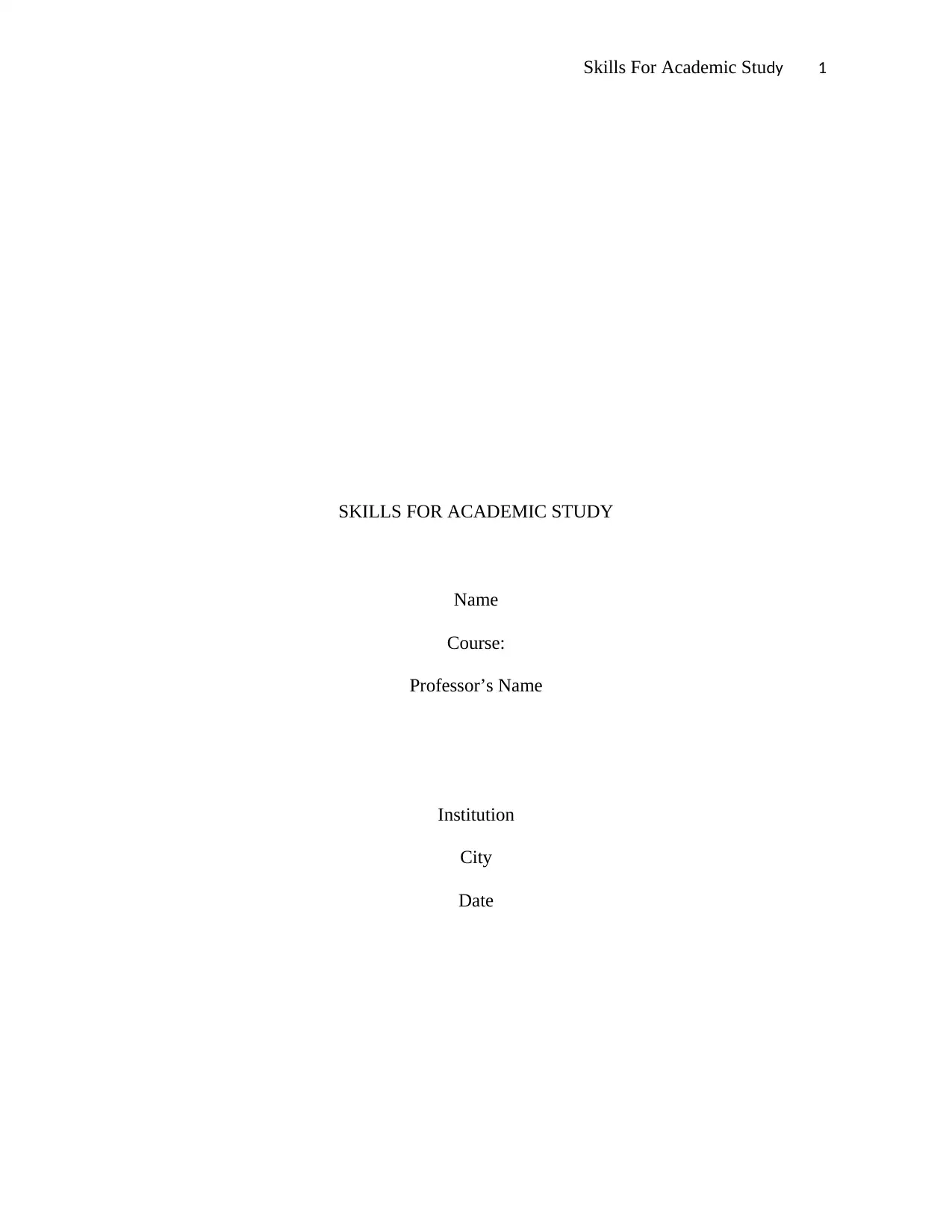
Skills For Academic Study 1
SKILLS FOR ACADEMIC STUDY
Name
Course:
Professor’s Name
Institution
City
Date
SKILLS FOR ACADEMIC STUDY
Name
Course:
Professor’s Name
Institution
City
Date
Paraphrase This Document
Need a fresh take? Get an instant paraphrase of this document with our AI Paraphraser
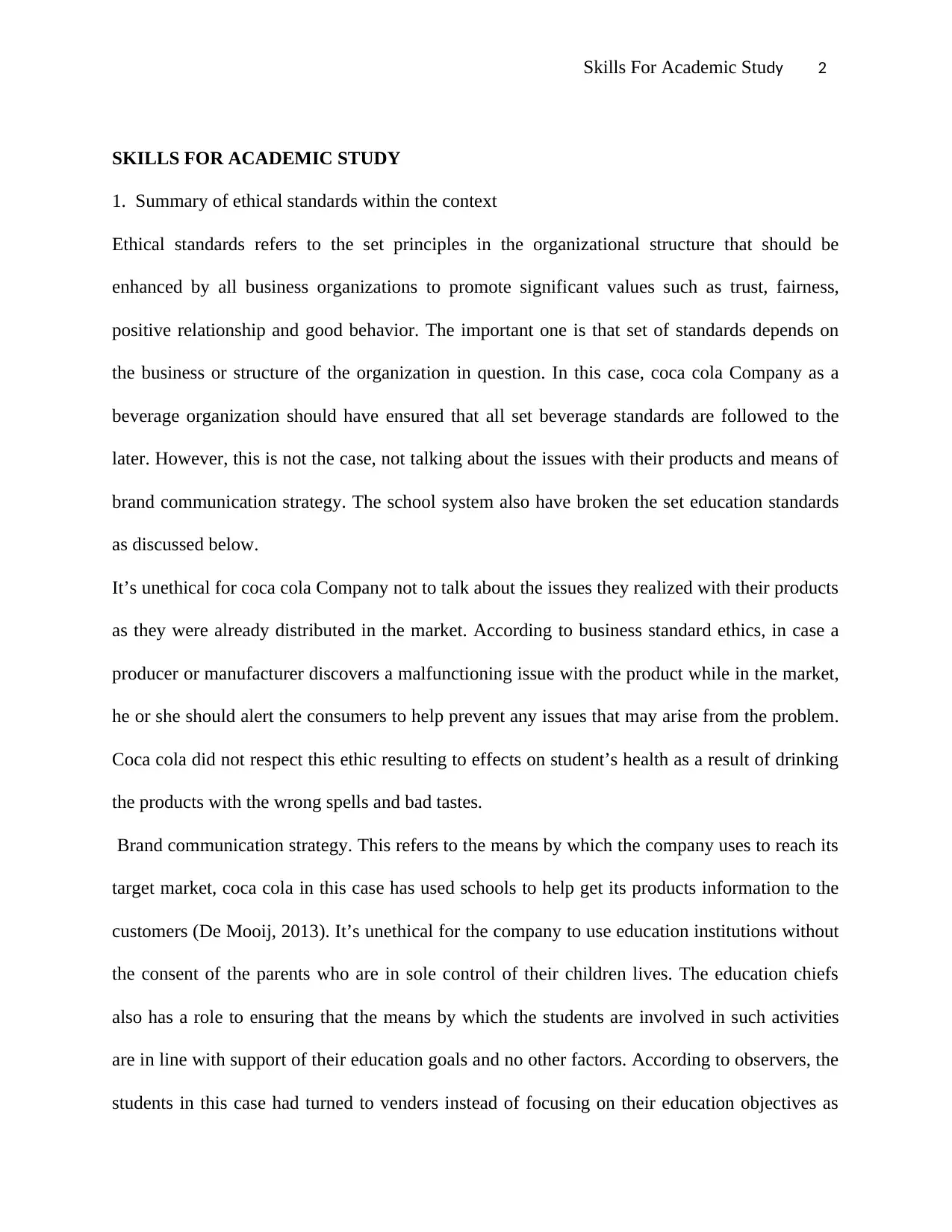
Skills For Academic Study 2
SKILLS FOR ACADEMIC STUDY
1. Summary of ethical standards within the context
Ethical standards refers to the set principles in the organizational structure that should be
enhanced by all business organizations to promote significant values such as trust, fairness,
positive relationship and good behavior. The important one is that set of standards depends on
the business or structure of the organization in question. In this case, coca cola Company as a
beverage organization should have ensured that all set beverage standards are followed to the
later. However, this is not the case, not talking about the issues with their products and means of
brand communication strategy. The school system also have broken the set education standards
as discussed below.
It’s unethical for coca cola Company not to talk about the issues they realized with their products
as they were already distributed in the market. According to business standard ethics, in case a
producer or manufacturer discovers a malfunctioning issue with the product while in the market,
he or she should alert the consumers to help prevent any issues that may arise from the problem.
Coca cola did not respect this ethic resulting to effects on student’s health as a result of drinking
the products with the wrong spells and bad tastes.
Brand communication strategy. This refers to the means by which the company uses to reach its
target market, coca cola in this case has used schools to help get its products information to the
customers (De Mooij, 2013). It’s unethical for the company to use education institutions without
the consent of the parents who are in sole control of their children lives. The education chiefs
also has a role to ensuring that the means by which the students are involved in such activities
are in line with support of their education goals and no other factors. According to observers, the
students in this case had turned to venders instead of focusing on their education objectives as
SKILLS FOR ACADEMIC STUDY
1. Summary of ethical standards within the context
Ethical standards refers to the set principles in the organizational structure that should be
enhanced by all business organizations to promote significant values such as trust, fairness,
positive relationship and good behavior. The important one is that set of standards depends on
the business or structure of the organization in question. In this case, coca cola Company as a
beverage organization should have ensured that all set beverage standards are followed to the
later. However, this is not the case, not talking about the issues with their products and means of
brand communication strategy. The school system also have broken the set education standards
as discussed below.
It’s unethical for coca cola Company not to talk about the issues they realized with their products
as they were already distributed in the market. According to business standard ethics, in case a
producer or manufacturer discovers a malfunctioning issue with the product while in the market,
he or she should alert the consumers to help prevent any issues that may arise from the problem.
Coca cola did not respect this ethic resulting to effects on student’s health as a result of drinking
the products with the wrong spells and bad tastes.
Brand communication strategy. This refers to the means by which the company uses to reach its
target market, coca cola in this case has used schools to help get its products information to the
customers (De Mooij, 2013). It’s unethical for the company to use education institutions without
the consent of the parents who are in sole control of their children lives. The education chiefs
also has a role to ensuring that the means by which the students are involved in such activities
are in line with support of their education goals and no other factors. According to observers, the
students in this case had turned to venders instead of focusing on their education objectives as
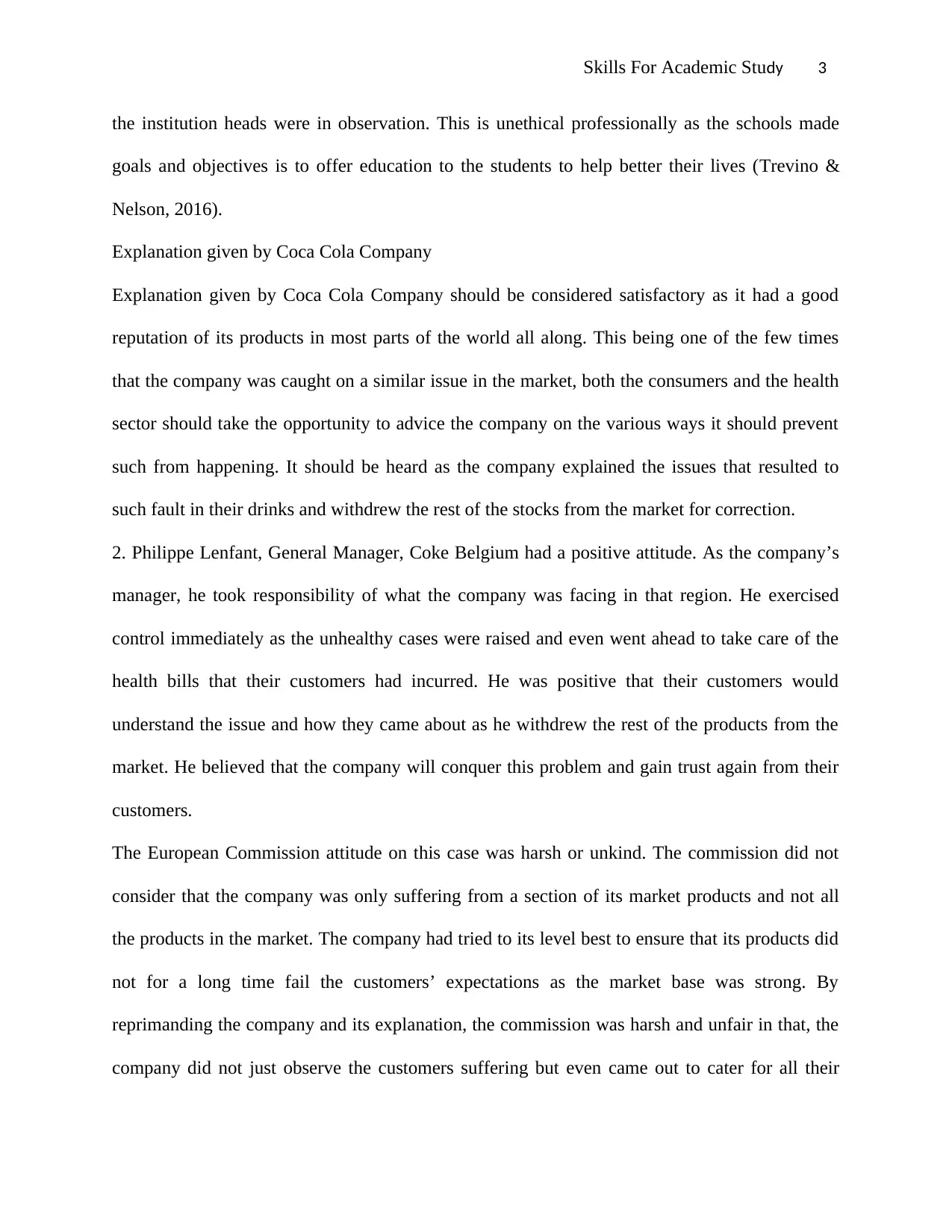
Skills For Academic Study 3
the institution heads were in observation. This is unethical professionally as the schools made
goals and objectives is to offer education to the students to help better their lives (Trevino &
Nelson, 2016).
Explanation given by Coca Cola Company
Explanation given by Coca Cola Company should be considered satisfactory as it had a good
reputation of its products in most parts of the world all along. This being one of the few times
that the company was caught on a similar issue in the market, both the consumers and the health
sector should take the opportunity to advice the company on the various ways it should prevent
such from happening. It should be heard as the company explained the issues that resulted to
such fault in their drinks and withdrew the rest of the stocks from the market for correction.
2. Philippe Lenfant, General Manager, Coke Belgium had a positive attitude. As the company’s
manager, he took responsibility of what the company was facing in that region. He exercised
control immediately as the unhealthy cases were raised and even went ahead to take care of the
health bills that their customers had incurred. He was positive that their customers would
understand the issue and how they came about as he withdrew the rest of the products from the
market. He believed that the company will conquer this problem and gain trust again from their
customers.
The European Commission attitude on this case was harsh or unkind. The commission did not
consider that the company was only suffering from a section of its market products and not all
the products in the market. The company had tried to its level best to ensure that its products did
not for a long time fail the customers’ expectations as the market base was strong. By
reprimanding the company and its explanation, the commission was harsh and unfair in that, the
company did not just observe the customers suffering but even came out to cater for all their
the institution heads were in observation. This is unethical professionally as the schools made
goals and objectives is to offer education to the students to help better their lives (Trevino &
Nelson, 2016).
Explanation given by Coca Cola Company
Explanation given by Coca Cola Company should be considered satisfactory as it had a good
reputation of its products in most parts of the world all along. This being one of the few times
that the company was caught on a similar issue in the market, both the consumers and the health
sector should take the opportunity to advice the company on the various ways it should prevent
such from happening. It should be heard as the company explained the issues that resulted to
such fault in their drinks and withdrew the rest of the stocks from the market for correction.
2. Philippe Lenfant, General Manager, Coke Belgium had a positive attitude. As the company’s
manager, he took responsibility of what the company was facing in that region. He exercised
control immediately as the unhealthy cases were raised and even went ahead to take care of the
health bills that their customers had incurred. He was positive that their customers would
understand the issue and how they came about as he withdrew the rest of the products from the
market. He believed that the company will conquer this problem and gain trust again from their
customers.
The European Commission attitude on this case was harsh or unkind. The commission did not
consider that the company was only suffering from a section of its market products and not all
the products in the market. The company had tried to its level best to ensure that its products did
not for a long time fail the customers’ expectations as the market base was strong. By
reprimanding the company and its explanation, the commission was harsh and unfair in that, the
company did not just observe the customers suffering but even came out to cater for all their
⊘ This is a preview!⊘
Do you want full access?
Subscribe today to unlock all pages.

Trusted by 1+ million students worldwide
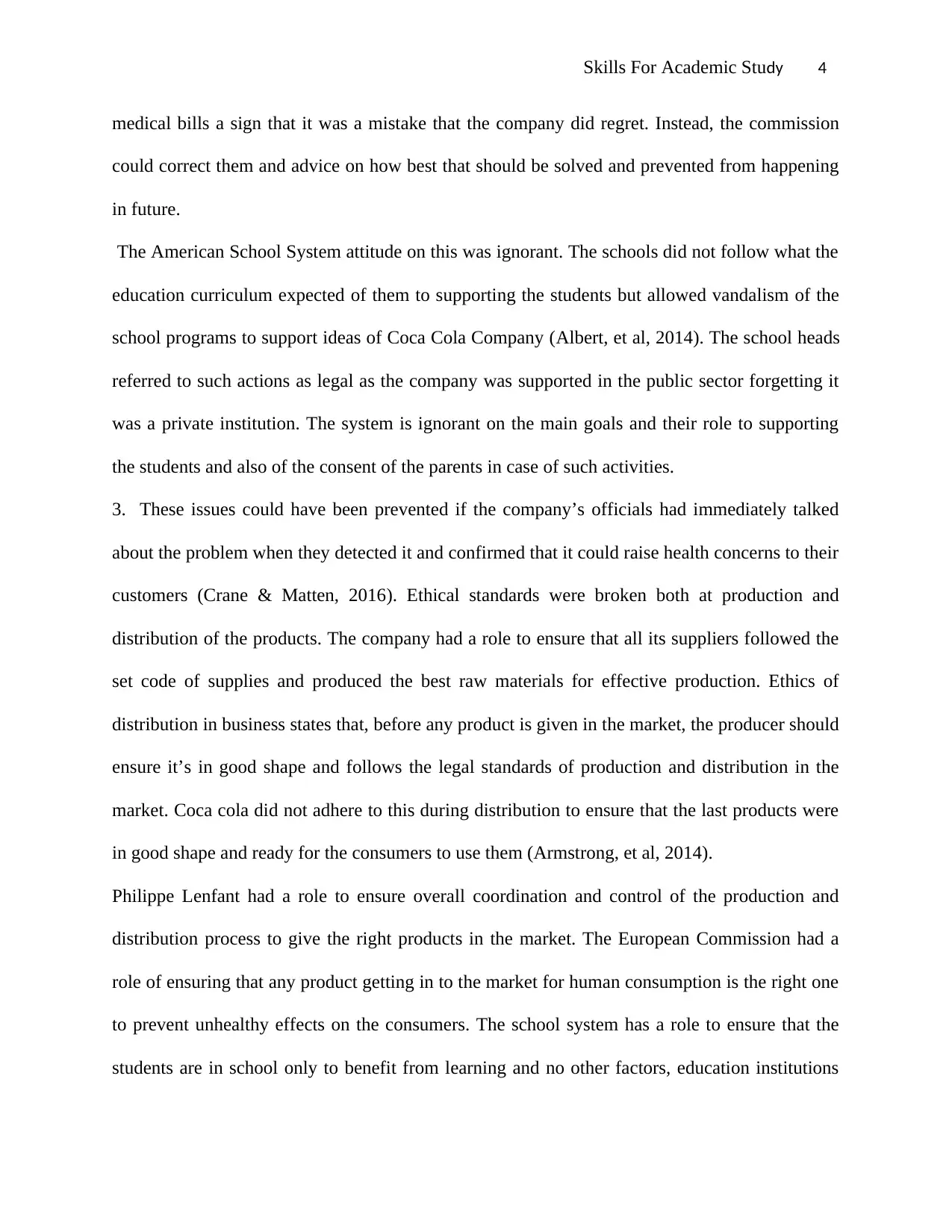
Skills For Academic Study 4
medical bills a sign that it was a mistake that the company did regret. Instead, the commission
could correct them and advice on how best that should be solved and prevented from happening
in future.
The American School System attitude on this was ignorant. The schools did not follow what the
education curriculum expected of them to supporting the students but allowed vandalism of the
school programs to support ideas of Coca Cola Company (Albert, et al, 2014). The school heads
referred to such actions as legal as the company was supported in the public sector forgetting it
was a private institution. The system is ignorant on the main goals and their role to supporting
the students and also of the consent of the parents in case of such activities.
3. These issues could have been prevented if the company’s officials had immediately talked
about the problem when they detected it and confirmed that it could raise health concerns to their
customers (Crane & Matten, 2016). Ethical standards were broken both at production and
distribution of the products. The company had a role to ensure that all its suppliers followed the
set code of supplies and produced the best raw materials for effective production. Ethics of
distribution in business states that, before any product is given in the market, the producer should
ensure it’s in good shape and follows the legal standards of production and distribution in the
market. Coca cola did not adhere to this during distribution to ensure that the last products were
in good shape and ready for the consumers to use them (Armstrong, et al, 2014).
Philippe Lenfant had a role to ensure overall coordination and control of the production and
distribution process to give the right products in the market. The European Commission had a
role of ensuring that any product getting in to the market for human consumption is the right one
to prevent unhealthy effects on the consumers. The school system has a role to ensure that the
students are in school only to benefit from learning and no other factors, education institutions
medical bills a sign that it was a mistake that the company did regret. Instead, the commission
could correct them and advice on how best that should be solved and prevented from happening
in future.
The American School System attitude on this was ignorant. The schools did not follow what the
education curriculum expected of them to supporting the students but allowed vandalism of the
school programs to support ideas of Coca Cola Company (Albert, et al, 2014). The school heads
referred to such actions as legal as the company was supported in the public sector forgetting it
was a private institution. The system is ignorant on the main goals and their role to supporting
the students and also of the consent of the parents in case of such activities.
3. These issues could have been prevented if the company’s officials had immediately talked
about the problem when they detected it and confirmed that it could raise health concerns to their
customers (Crane & Matten, 2016). Ethical standards were broken both at production and
distribution of the products. The company had a role to ensure that all its suppliers followed the
set code of supplies and produced the best raw materials for effective production. Ethics of
distribution in business states that, before any product is given in the market, the producer should
ensure it’s in good shape and follows the legal standards of production and distribution in the
market. Coca cola did not adhere to this during distribution to ensure that the last products were
in good shape and ready for the consumers to use them (Armstrong, et al, 2014).
Philippe Lenfant had a role to ensure overall coordination and control of the production and
distribution process to give the right products in the market. The European Commission had a
role of ensuring that any product getting in to the market for human consumption is the right one
to prevent unhealthy effects on the consumers. The school system has a role to ensure that the
students are in school only to benefit from learning and no other factors, education institutions
Paraphrase This Document
Need a fresh take? Get an instant paraphrase of this document with our AI Paraphraser
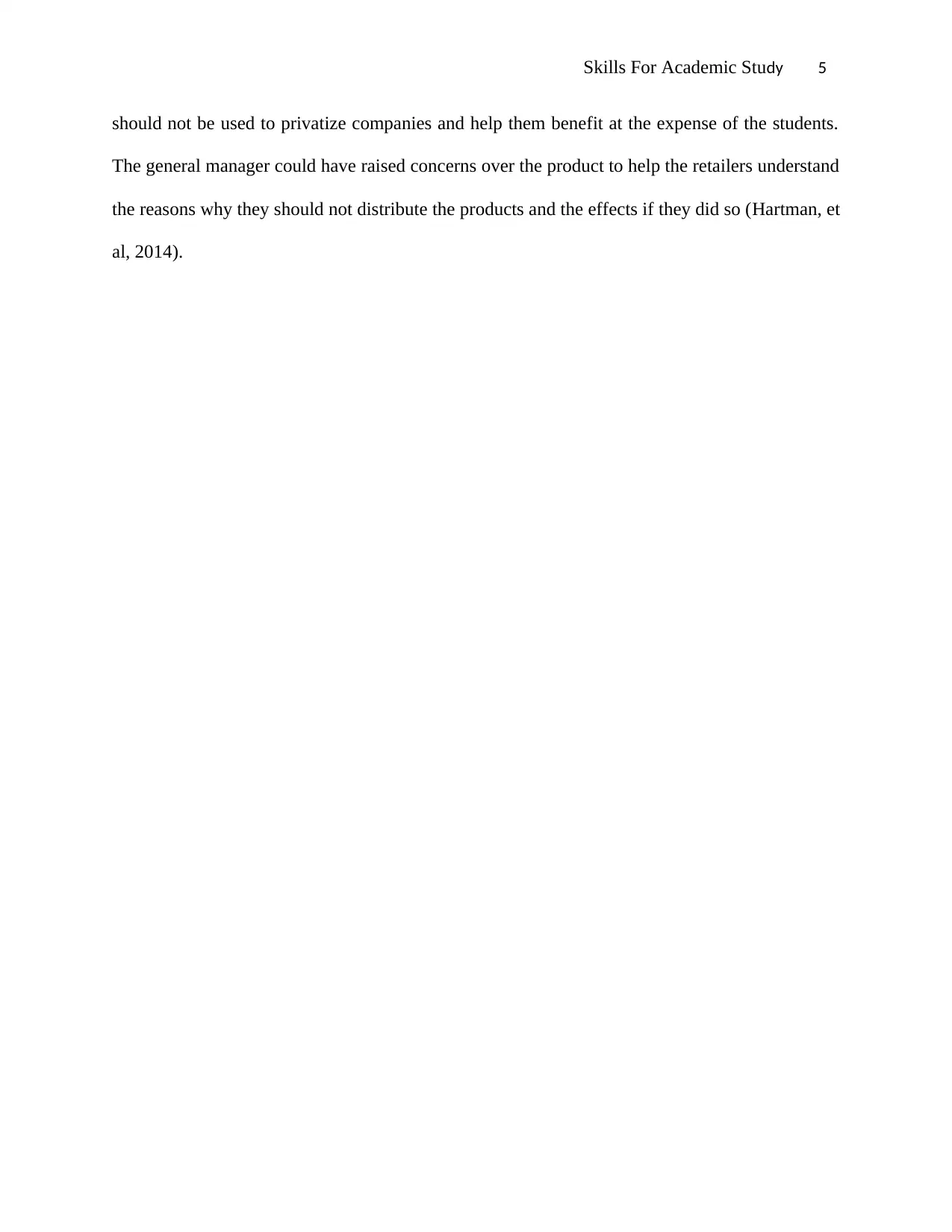
Skills For Academic Study 5
should not be used to privatize companies and help them benefit at the expense of the students.
The general manager could have raised concerns over the product to help the retailers understand
the reasons why they should not distribute the products and the effects if they did so (Hartman, et
al, 2014).
should not be used to privatize companies and help them benefit at the expense of the students.
The general manager could have raised concerns over the product to help the retailers understand
the reasons why they should not distribute the products and the effects if they did so (Hartman, et
al, 2014).
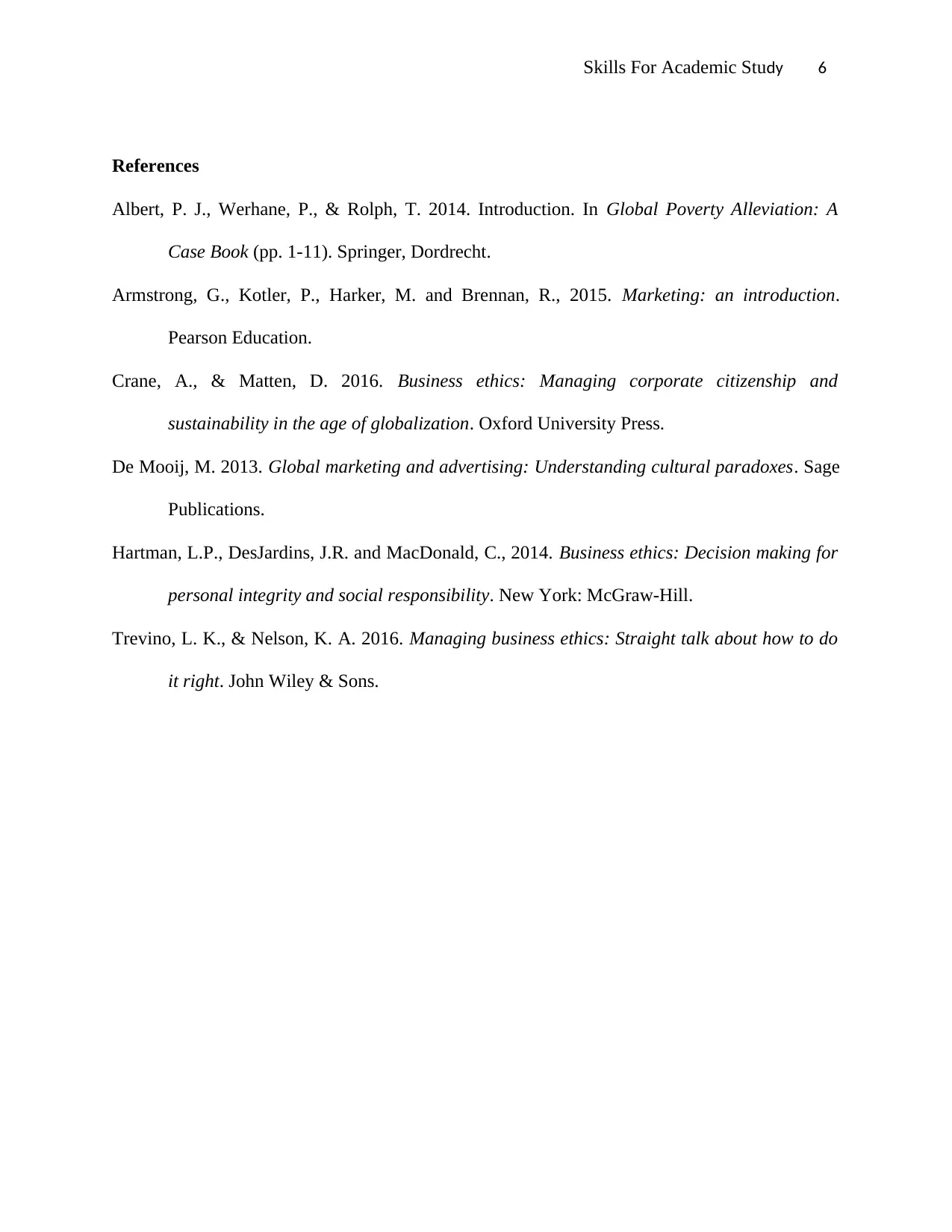
Skills For Academic Study 6
References
Albert, P. J., Werhane, P., & Rolph, T. 2014. Introduction. In Global Poverty Alleviation: A
Case Book (pp. 1-11). Springer, Dordrecht.
Armstrong, G., Kotler, P., Harker, M. and Brennan, R., 2015. Marketing: an introduction.
Pearson Education.
Crane, A., & Matten, D. 2016. Business ethics: Managing corporate citizenship and
sustainability in the age of globalization. Oxford University Press.
De Mooij, M. 2013. Global marketing and advertising: Understanding cultural paradoxes. Sage
Publications.
Hartman, L.P., DesJardins, J.R. and MacDonald, C., 2014. Business ethics: Decision making for
personal integrity and social responsibility. New York: McGraw-Hill.
Trevino, L. K., & Nelson, K. A. 2016. Managing business ethics: Straight talk about how to do
it right. John Wiley & Sons.
References
Albert, P. J., Werhane, P., & Rolph, T. 2014. Introduction. In Global Poverty Alleviation: A
Case Book (pp. 1-11). Springer, Dordrecht.
Armstrong, G., Kotler, P., Harker, M. and Brennan, R., 2015. Marketing: an introduction.
Pearson Education.
Crane, A., & Matten, D. 2016. Business ethics: Managing corporate citizenship and
sustainability in the age of globalization. Oxford University Press.
De Mooij, M. 2013. Global marketing and advertising: Understanding cultural paradoxes. Sage
Publications.
Hartman, L.P., DesJardins, J.R. and MacDonald, C., 2014. Business ethics: Decision making for
personal integrity and social responsibility. New York: McGraw-Hill.
Trevino, L. K., & Nelson, K. A. 2016. Managing business ethics: Straight talk about how to do
it right. John Wiley & Sons.
⊘ This is a preview!⊘
Do you want full access?
Subscribe today to unlock all pages.

Trusted by 1+ million students worldwide
1 out of 6
Related Documents
Your All-in-One AI-Powered Toolkit for Academic Success.
+13062052269
info@desklib.com
Available 24*7 on WhatsApp / Email
![[object Object]](/_next/static/media/star-bottom.7253800d.svg)
Unlock your academic potential
Copyright © 2020–2026 A2Z Services. All Rights Reserved. Developed and managed by ZUCOL.





